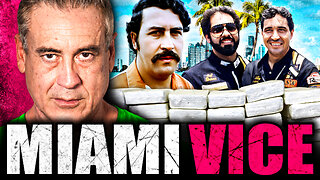Premium Only Content

Episode 2591: A Priest for the Ages - Fr. Michael Rowe and the Cost of Tradition
Today, we’re diving into the life and challenges of a priest whose dedication to the Traditional Latin Mass has brought him both great joy and tremendous hardship: Fr. Michael Rowe.
Fr. Rowe’s story isn’t just about one priest standing firm in his vocation. It touches on deeper issues obedience to Christ versus compliance with modern trends, the spiritual richness of tradition versus the pressure to conform to innovation, and how the Church today grapples with Traditionis Custodes. Fr. Rowe’s plight reveals how the spiritual battle is playing out in dioceses worldwide.
As we explore his journey, we’ll also reflect on Scripture, tradition, and the significance of standing firm in faith, even when the world or in this case, the Church’s own hierarchy seeks to silence that witness. Let’s begin.
Segment 1: Fr. Rowe's Journey: Faith, Vocation, and Sacrifice
Fr. Michael Rowe was ordained in 1994, after spending years discerning his vocation. Raised by his grandmother after the tragic loss of his parents, Fr. Rowe discovered Christ through the silent beauty of the Mass. As he once shared:
“It was in the silence of just going to Mass on my own that I realized there was someone who cared for me and loved me.”
This encounter with God set him on a path to the priesthood a path not focused on worldly success but on eternal salvation. Leaving behind a promising career in metallurgy, Fr. Rowe dedicated himself to serving souls through the sacraments. His priestly life has been marked by baptisms, weddings, funerals, and every moment in between, walking with people through both joy and sorrow.
This is precisely the kind of priest we need today a shepherd whose primary concern is leading souls to Christ. For 25 years, the Archdiocese of Perth publicly celebrated his priesthood, highlighting his service as a shining example. Yet, things took a turn when Fr. Rowe’s love for the Traditional Latin Mass put him at odds with the modernist shift within the Church.
Segment 2: Traditionis Custodes and the Price of Fidelity
Fr. Rowe’s dedication to the Latin Mass and the pre-Vatican II sacraments became a source of conflict when Traditionis Custodes was issued by Pope Francis. This motu proprio placed heavy restrictions on the use of the 1962 Missal, signaling an effort to phase out the old rites. Many priests, like Fr. Rowe, faced immense pressure to abandon the Latin Mass a liturgy that has nourished the faithful for centuries.
When Fr. Rowe resisted these restrictions, the response from his bishop was swift and severe. The Archdiocese froze his parish’s bank accounts, revoked his appointment as rector of St. Anne’s in Belmont, and accused him of misconduct. His only crime? Offering the sacraments in the form that had sanctified generations of Catholics.
As Fr. Rowe himself put it:
“I have serious problems with some of the above propositions, which simply contain factual errors or attempt to assert things that I simply do not believe are true... My concern with these statements is that they represent a rupture from the truth and tradition of the Church.”
These words reflect the heart of the issue: Fr. Rowe could not, in good conscience, comply with demands that he believed were a break from authentic Catholic teaching. He chose fidelity to Christ and the perennial tradition of the Church over the demands of modern innovations.
Segment 3: The Spirit of Obedience: To God or Man?
Fr. Rowe’s story brings us to an important question: What does obedience really mean? Scripture teaches us to obey legitimate authority, but our ultimate obedience is always to God. As St. Peter boldly proclaimed before the Sanhedrin:
"We must obey God rather than men" (Acts 5:29).
Obedience in the Catholic sense is not blind compliance; it is rooted in truth. When bishops or popes promote teachings or practices that appear to deviate from the faith handed down through the ages, faithful Catholics have the right and at times, the duty to resist. Archbishop Marcel Lefebvre, whose efforts to preserve the Traditional Latin Mass inspired many, once said:
"We are not rebelling against the Pope, but rather against errors."
Fr. Rowe’s decision to leave his parish and offer Mass independently reflects this spirit of resistance. His public witness reminds us that the Mass is not just a ritual it is the highest form of worship, expressing the truths of our faith. Lex orandi, lex credenda how we pray reflects what we believe.
Segment 4: The Trials of Faith and Hope in Christ
In recent months, Fr. Rowe has continued to offer the Latin Mass privately, even as his reputation has been attacked and his faculties revoked. Like many traditional priests, he has been made a pariah within his own diocese. But his example reminds us of Christ’s words in the Gospel of John:
"If the world hates you, know that it has hated me before it hated you" (John 15:18).
Throughout Church history, the faithful have often faced opposition, even from within the Church. Cardinal Pell’s unjust imprisonment and eventual vindication come to mind as a modern example of enduring persecution with faith and trust in God. Fr. Rowe’s story is not just about personal suffering it is about standing firm in the truth of the faith, no matter the cost.
How St. Pope Pius X Would View This Situation
To better understand the gravity of Father Rowe’s case, we turn to the teachings of St. Pope Pius X, a pope renowned for his defense of Catholic tradition, his reform of the liturgy, and his war against the heresy of modernism. If Pius X were alive today, how might he respond to the suppression of the Traditional Latin Mass and the treatment of priests like Father Rowe?
1. Obedience Rooted in Fidelity to Christ
Pope Pius X taught that obedience to Church authority must be rooted in fidelity to Christ and Sacred Tradition. In his encyclical “Vehementer Nos”, he stressed the importance of unity within the Church but warned that unity cannot come at the expense of truth. For Pius X, blind obedience to directives that contradict the faith or rupture with tradition would not constitute true obedience.
Father Rowe’s resistance echoes this principle. He refuses to sign a document affirming the Novus Ordo as the sole expression of the Roman Rite because he believes it distorts the continuity of the faith. This aligns with Pius X’s teaching that authentic reform must preserve, not discard, the treasures of the Church’s heritage.
2. The Liturgical Reform According to Pius X
Pius X was a liturgical reformer, but his reforms sought to deepen reverence, increase participation in the sacred, and safeguard the integrity of the liturgy. He emphasized the importance of Gregorian chant and called for the faithful to actively engage in the liturgy without diminishing its sacred character.
In stark contrast, the post-Vatican II liturgical changes and especially the restrictions imposed by Traditionis Custodes have sought to minimize the role of the sacred, reduce traditional elements, and make the Mass more “accessible.” Pius X would likely view the suppression of the TLM not as a legitimate reform but as a betrayal of the very essence of liturgical worship.
3. Modernism and the Ape of the Church
Pius X famously referred to modernism as the “synthesis of all heresies”. He foresaw a time when modernist theologians would attempt to replace the unchanging truths of the faith with new, evolving doctrines. In many ways, this prophetic warning seems to have come to pass. The push to suppress the TLM and introduce culturally adapted liturgies such as the Amazonian Rite reflects the influence of modernism within the Church.
Father Rowe’s resistance to these developments is entirely in line with Pius X’s battle against modernism. He refuses to affirm that the post-Vatican II liturgical books are the unique expression of the Roman Rite because he believes this represents a rupture with tradition. For Pius X, preserving continuity with the past was essential to safeguarding the faith for future generations.
The Road Ahead: Lessons from Pius X and Father Rowe
What are we to do when the Church itself seems to be divided? The example of St. Pope Pius X offers us several key lessons. First, obedience to Christ and Sacred Tradition must come first, even when it leads to personal suffering. Second, the faithful must cling to the Church’s heritage, especially in times of crisis, recognizing that the law of worship shapes the law of belief.
Father Rowe’s story reminds us that those who stand for tradition will often face persecution, just as Pius X faced opposition during his pontificate. However, both the life of this great saint and the witness of priests like Father Rowe teach us that the truth is worth defending no matter the cost.
Conclusion: A Call to Pray for Our Priests
Fr. Michael Rowe’s journey is a reminder of the importance of praying for our priests, especially those who courageously uphold tradition in the face of opposition. Their sacrifices ensure that the treasures of the faith are not lost to the sands of time. The Church today needs priests like Fr. Rowe men who are willing to say, as St. Paul did:
"I have fought the good fight, I have finished the race, I have kept the faith" (2 Timothy 4:7).
Let us pray for Fr. Rowe and for all priests who are suffering for their fidelity to Christ and His Church. May their example inspire us to remain steadfast in our own faith, knowing that our true reward lies not in the approval of men but in the promise of eternal life.
Closing Prayer
Heavenly Father,
We thank You for the gift of faithful priests who guide Your flock with love and devotion. We lift up Fr. Michael Rowe and all priests facing persecution for their fidelity to the truths of the faith. Strengthen them with Your grace, console them in their trials, and protect them from every harm.
Lord, may Your Holy Spirit inspire in all of us a deeper love for the Mass and a firm commitment to the truth. Help us to always seek Your will above all else and to remain faithful, even when the path is difficult. Through the intercession of the Blessed Virgin Mary, may we be granted the courage to stand firm in the faith until the end.
We ask this in the name of Your Son, our Lord Jesus Christ, who lives and reigns with You in the unity of the Holy Spirit, God forever and ever. Amen.
Thank you for joining us today. Until next time, may God bless you and keep you faithful to His truth.
-
 1:56:48
1:56:48
Tundra Tactical
8 hours ago $15.33 earnedFull Semi-Auto Comedy Hour
39.5K3 -
 2:07:31
2:07:31
The Connect: With Johnny Mitchell
18 hours ago $10.74 earnedSecrets Of The Cocaine Cowboys: Miami Drug Lord Reveals Truth About His BILLION-DOLLAR Coke Empire
35.9K5 -
 1:55:52
1:55:52
BlackDiamondGunsandGear
1 day agoGlocks Want Gun Control? // Trump Tramples on your Rights? // After Hours Armory
33.5K4 -
 1:55:52
1:55:52
DLDAfterDark
13 hours ago $5.54 earnedDLD Live! Trump - Flag Burning - Glock & Gun Control - Martial Law Light?? - After Hours Armory
27.1K4 -
 13:46:18
13:46:18
GritsGG
19 hours agoRumble Customs! 3515 Ws! 🫡!
96.2K -
 5:59:47
5:59:47
SpartakusLIVE
15 hours agoThe HUGEST Brain (not forehead) delivers Saturday SPARTOONS || Variety Later - Shadow of Mordor
199K4 -
 2:34:20
2:34:20
Barry Cunningham
16 hours agoPRESIDENT TRUMP WELCOMES FOOTBALL SEASON! AND MORE BREAKING NEWS!
91.7K56 -
 54:47
54:47
Side Scrollers Podcast
19 hours agoSide Scroller Presents KING OF THE KART | MASSIVE MARIO KART TOURNAMENT
53.5K1 -
 4:12:33
4:12:33
Mally_Mouse
19 hours ago🔥🍺Spicy HYDRATE Saturday!🍺🔥-- Let's Play: Baldur's Gate!
42K3 -
 2:26:32
2:26:32
BooniesHQ
15 hours agoGame Of SKATE Shaun Hover Vs. Jeff DeChesare: Boonies Skate Night 1
114K7